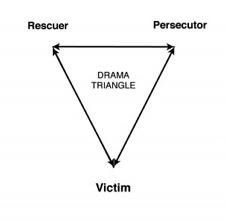Lots of us are determined “rescuers” – that’s what Christians are meant to be, aren’t we? Go the extra mile; give up our coat (well maybe not this wet and windy week!) kind of people?
Recently I presented a case (anonymously) in my supervision group of a couple who were having particularly heated counselling sessions. As the counsellor, I do have to take some responsibility for a reasonable outcome to the counselling, yet whatever I tried with this couple, nothing was working.
As I outlined the case to my colleagues, one of them commented “oh this is classic drama triangle stuff”. Of course, why hadn’t I sent that? I realised that in the chaos, the couple were inviting me to “rescue” them, so they would not have to do the hard work required.
My colleague was referring to the Karpman Drama Triangle devised by Stephen Karman in the 1960’s to describe the roles we can adopt in certain situations.
We are all mostly familiar with the term “victim” describing someone who doesn’t take responsibility for themselves or what happens in their lives and blames others constantly. We are less familiar with the idea that often when there is a “victim”, those around the victim have been pulled into the drama triangle, often to rescue them. Then there is the persecutor, who criticises and blames the other members of the triangle.
A common one seen in families with teenagers is the teenager who (frequently) doesn’t get themselves up on time and misses the school bus; s/he goes to one parent pleading for a lift to school. The parent berates the child angrily, launching into a string of accusations about all their past failings as a teenager: the by standing parent jumps in, soothingly, “of course, I’ll take you all the way to school, darling”.
The drama of the triangle can be compounded as members move around and adopt other roles. In the case above, the rescuing parent can start to “persecute” the angry parent, telling them all about their failings as a parent and can’t they be more reasonable. The teenager can similarly jump quickly into the persecutor role. Then the originally angry parent can adopt a victim position “you two are as thick as thieves and are always leaving me out of decision making in this household. I feel as if I have no role at all here”. And so on…..
This pattern all too often infests church disputes. Someone is upset with a staff member about what has been said to them. They go to their Bible study group and share and ask for prayer about this “terrible” situation (victim/persecutor). The group lovingly gathers around them, prays and offers to speak to the staff member on the other person’s behalf (are “rescuers”). They can degenerate into “persecutors” by talking with others about the terrible way that the staff member had behaved. Word of the discussions gets back to the staff member – now they feel like the victim and can continue the drama or not.
Is rescuing ever a valid response? Yes – when someone genuinely needs rescuing and the person is in genuine need of rescuing – that is they can’t get themselves out of the situation without assistance, having used all their own resources. The unhealthy rescuer sees themselves as a “helper” or “caretaker”. They need someone to rescue (victim) in order to feel vital and important.
I often ponder Jesus’ words to the man at the pool of Siloam “do you want to get well”. Was that a challenge to his “victimhood”, demanding that the man in some way had to participate in his healing? Do we do this in our dealings with those whom we help?























